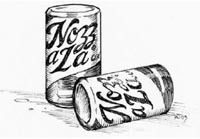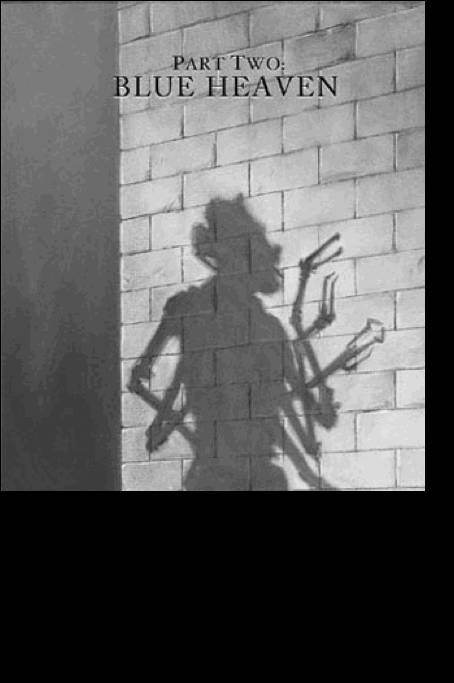Later he would hear her tale, every wordand to the end. Later there would be time for palaver. For now he cupped herbreast—the left one, so he could feel the strong, steady beat of herheart—and then stopped her speech with his mouth.
Jake, meanwhile, said nothing. He stoodwith his head turned so his cheek rested against Roland’s midsection. His eyeswere closed. He could smell rain and dust and blood on the gunslinger’s shirt.He thought of his parents, who were lost; his friend Benny, who was dead; thePere, who had been overrun by all those from whom he had so long fled. The manhe held had betrayed him once for the Tower, had let him fall, and Jakecouldn’t say the same might not happen again. Certainly there were miles ahead,and they would be hard ones. Still, for now, he was content. His mind was quietand his sore heart was at peace. It was enough to hold and be held.
Enough to stand here with his eyes shut andto think My father has come for me.

PART TWO
BLUE HEAVEN
DEVAR-TOI

Chapter I:
The Devar-Tete
One
The four reunited travelers (five, countingOy of Mid-World) stood at the foot of Mia’s bed, looking at what remained ofSusannah’s twim, which was to say her twin. Without the deflated clothesto give the corpse some definition, probably none of them could have said forcertain what it had once been. Even the snarl of hair above the split gourd ofMia’s head looked like nothing human; it could have been an exceptionally largedust-bunny.
Roland looked down at the disappearingfeatures, wondering that so little remained of the woman whoseobsession—the chap, the chap, always the chap—had come so near towrecking their enterprise for good. And without them, who would remain to standagainst the Crimson King and his infernally clever chancellor? John Cullum,Aaron Deepneau, and Moses Carver. Three old men, one of them with blackmouthdisease, which Eddie called can’t, sir.
So much you did, he thought, gazingraptly at the dusty, dissolving face. So much you did and so much more youwould have done, aye, and all without a check or qualm, and so will the worldend, I think, a victim of love rather than hate. For love’s ever been the moredestructive weapon, sure.
He leaned forward, smelling what could havebeen old flowers or ancient spices, and exhaled. The thing that looked vaguelylike a head even now blew away like milkweed fluff or a dandy-o ball.
“She meant no harm to the universe,”Susannah said, her voice not quite steady. “She only wanted any woman’sprivilege: to have a baby. Someone to love and raise.”
“Aye,” Roland agreed, “you say true. Whichis what makes her end so black.”
Eddie said, “Sometimes I think we’d all bebetter off if the people who mean well would just creep away and die.”
“That’d be the end of us, Big Ed,”Jake pointed out.
They all considered this, and Eddie foundhimself wondering how many they’d already killed with their well-intentionedmeddling. The bad ones he didn’t care about, but there had been others,too—Roland’s lost love, Susan, was only one.
Then Roland left the powdery remains ofMia’s corpse and came to Susannah, who was sitting on one of the nearby bedswith her hands clasped between her thighs. “Tell me everything that befell sinceyou left us on the East Road, after the battle,” he said. “We need to—”
“Roland, I never meant to leave you. It wasMia. She took over. If I hadn’t had a place to go—a Dogan—shemight’ve taken over completely.”
Roland nodded to show he understood that.“Nevertheless, tell me how you came to this devar-tete. And Jake, I’d hear thesame from you.”
“Devar-tete,” Eddie said. The phrase heldsome faint familiarity. Did it have something to do with Chevin of Chayven, theslow mutie Roland had put out of its misery in Lovell? He thought so. “What’sthat?”
Roland swept a hand at the room with allits beds, each with its helmet-like machine and segmented steel hose; bedswhere the gods only knew how many children from the Callas had lain, and beenruined. “It means little prison, or torture-chamber.”
“Doesn’t look so little to me,” Jake said.He couldn’t tell how many beds there were, but he guessed the number at threehundred. Three hundred at least.
“Mayhap we’ll come upon a larger one beforewe’re finished. Tell your tale, Susannah, and you too, Jake.”
“Where do we go from here?” Eddie asked.
“Perhaps the tale will tell,” Rolandanswered.
Two
Roland and Eddie listened in silentfascination as Susannah and Jake recounted their adventures, turn and turnabout. Roland first halted Susannah while she was telling them of Mathiessenvan Wyck, who had given her his money and rented her a hotel room. Thegunslinger asked Eddie about the turtle in the lining of the bag.
“I didn’t know it was a turtle. Ithought it might be a stone.”
“If you’d tell this part again, I’d hear,”Roland said.
So, thinking carefully, trying to remembercompletely (for it all seemed a very long time ago), Eddie related how he andPere Callahan had gone up to the Doorway Cave and opened the ghostwood box withBlack Thirteen inside. They’d expected Black Thirteen to open the door, and soit had, but first—
“We put the box in the bag,” Eddie said.“The one that said NOTHING BUT STRIKES AT MIDTOWN LANES in New York and NOTHINGBUT STRIKES AT MID-WORLD LANES on the Calla Bryn Sturgis side.Remember?”
They all did.
“And I felt something in the lining of thebag. I told Callahan, and he said…” Eddie mulled it over. “He said, ‘This isn’tthe time to investigate it.’ Or something like that. I agreed. I rememberthinking we had enough mysteries on our hands already, we’d save this one foranother day. Roland, who in God’s name put that thing in the bag, do youthink?”
“For that matter, who left the bag in thevacant lot?” Susannah asked.
“Or the key?” Jake chimed in. “I found thekey to the house in Dutch Hill in that same lot. Was it the rose? Did the rosesomehow… I dunno… make them?”
Roland thought about it. “Were I to guess,”he said, “I’d say that sai King left those signs and siguls.”
“The writer,” Eddie said. He weighed theidea, then nodded slowly. He vaguely remembered a concept from highschool—the god from the machine, it was called. There was a fancy Latinterm for it as well, but that one he couldn’t remember. Had probably beenwriting Mary Lou Kenopensky’s name on his desk while the other kids had beenobediently taking notes. The basic concept was that if a playwright got himselfinto a corner he could send down the god, who arrived in a flower-decked buckawagon from overhead and rescued the characters who were in trouble. This nodoubt pleased the more religious playgoers, who believed that God—not thespecial-effects version who came down from some overhead platform the audiencecouldn’t see but the One who wert in heaven—really did save peoplewho deserved it. Such ideas had undoubtedly gone out of fashion in the modernage, but Eddie thought that popular novelists—of the sort sai King seemedon his way to becoming—probably still used the technique, only disguisingit better. Little escape hatches. Cards that read GET OUT OF JAIL FREE orESCAPE THE PIRATES or FREAK STORM CUTS ELECTRICAL POWER, EXECUTION POSTPONED.The god from the machine (who was actually the writer), patiently working tokeep the characters safe so his tale wouldn’t end with an unsatisfying linelike “And so the ka-tet was wiped out on Jericho Hill and the bad guys won,rule Discordia, so sorry, better luck next time (what next time, ha-ha),THE END.”